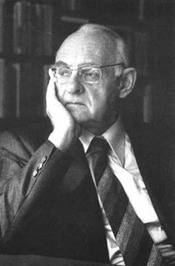I thought this quote, while speaking to another issue (Barth and Balthasar’s disagreement over key theological points), is apropos in regards to how Protestant Christians approach the scriptures, interpretively. It is interesting that we can look at the same scriptures, and come to such different conclusions — on certain points of dogma and theological  emphasis. This quote from Balthasar (quoting something else, see the biblio info) helps state the reality of this conundrum:
emphasis. This quote from Balthasar (quoting something else, see the biblio info) helps state the reality of this conundrum:
The battle is so serious because neither side can seriously deny that it is really the same object we refer to, but at the same time we can find no way to find unity over its right concept. . .. The dispute is therefore so pressing and urgent because we see the same reality in different ways, even if we dare not say that, by God’s eternal and unfathomable decree, the same reality is looking at us in such different ways. Thus, because we see so differently (aliter), we also end up seeing, at least partially, something different (alia). And thus, the dispute over the How (quale) comes to affect in fundamental ways all the secondary divergences over the What (quantum) . . ..[1]
This principle applies to many situations. Given a concern of mine, on interpretive traditions, this could be applied to that reality. So, in other words, “How” we understand God (our Doctrine of God), will inestimably, shape “What” our interpretive conclusions will be when we come to the text of scripture. This is so, because if scripture discloses God one way, and we have already conceived Him to be another way; then we most certainly will fail to see Him at all, when we actually try to read scripture. A consequence, if we presuppose a certain schema about God (i.e., that He is the unmoved mover of Thomas Aquinas and Aristotle) that is foreign to the God of the Bible; and then we develop methods of interpretation that are consonant with this preconceived notion, we are most certainly going to be reading “our” God into scripture — instead of reading Him “out” of it.
Scripture is to point us to Someone beyond itself, but if we don’t allow scripture to impose its own categories and objectives upon us; then we are doomed to find that we are only looking at our own reflections as we peer into it as a mirror of “our” souls. If we have a fundamental disagreement on Who God is (in other words, does our metaphysic predetermine who God is before we get to Him in Christ, or do we start with our knowledge of Him at the cross of Christ as the second person of the Trinity), then it is only natural that we will have a fundamental disagreement on how we should read this God off of scripture. Make sense . . .
Certainly, we all, as historic-orthodox Christians believe God is triune; but do we really allow scripture and the Revelation of Christ to shape what that means (and thus follow an interpretive model that places its center (Christ) at the foreground of our interpretive approach); or do we come to scripture, artificially seeking a God who will fit our preconceived notions of what “we” think God should look like (e.g. His “glory,” not foolishness, but “wisdom” per I Cor. 1:17ff). Certainly, nobody is immune to this problem; but I would suggest that much of Protestant Christianity (not just Protestant), especially Classically Reformed-Fundamentalist-Evangelicals (picking on them, because this is my own background), has followed a “method” (or mode) that has caused an articulation of God that is at odds with the one we meet in Christ-at-the-Cross.
[1] Hans Urs Von Balthasar, Die Theologie und die Kirche [Munich: Chr. Kaiser Verlag, 1938]. Collected articles, 1920-1928.
*Post originally posted on August 29th, 2009 at a now defunct blog of mine.
